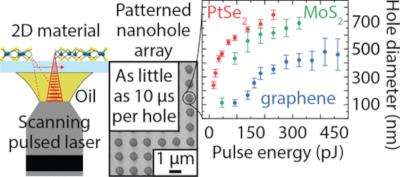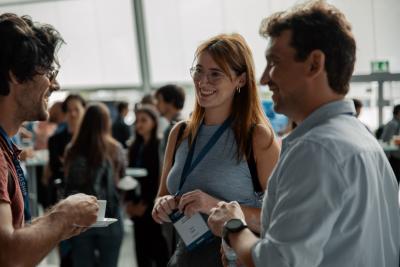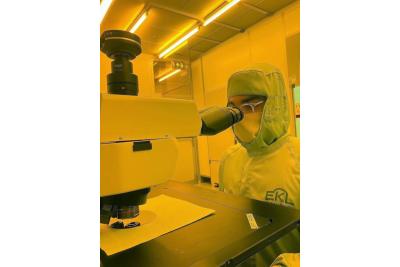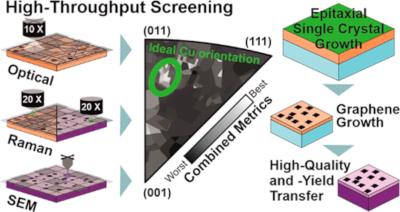Graphene Flagship: Europe's $1 billion graphene initiative - Page 2
Researchers pattern 2D materials using a commercial two-photon 3D printer
Researchers from the University of the Bundeswehr Munich & SENS Research Center and KTH Royal Institute of Technology recently demonstrated the noncontact and resist-free patterning of platinum diselenide (PtSe2), molybdenum disulfide (MoS2), and graphene layers with nanoscale precision at high processing speed while preserving the integrity of the surrounding material.
The team used a commercial, off-the-shelf two-photon 3D printer to directly write patterns in the 2D materials with features down to 100 nm at a maximum writing speed of 50 mm/s.
Researchers develop an aptasensor based on a novel graphene derivative equipped with alkyne groups
Researchers find a way to make the detection of antibiotic residues in water more quick and simple. The research team included scientists from the Czech Advanced Technology and Research Institute (CATRIN) at Palacký University and the Technical University of Ostrava. The new biosensor looks like a small box connected to a mobile phone. This device can immediately detect even very small antibiotic residues, namely ampicillin, in water or dairy products.
It is based on a tailor-made nanomaterial derived from fluorographene, developed by scientists from the Graphene Flagship Associated Member Czech Advanced Technology and Research Institute (CATRIN) of Palacký University and its Faculty of Science (Czech Republic). They used the so-called click chemistry method, which was awarded the Nobel Prize in Chemistry last year.
Apply today to take part in the Graphene Flagship experimental 2D pilot line!
The Graphene Flagship’s 2D Experimental Pilot Line (2D-EPL) is offering the opportunity to take part in a multi project wafer run integrating graphene into silicon wafers. This run is mainly intended for electronics but can also include sensor devices (e.g. Hall sensor, but via opening on graphene is not in the scope of this run) and will be provided by AMO GmbH. The design of the device can be adjusted within the specifications. Apply today to receive more information or to discuss your design ideas with our team.
- Why apply?
- Affordable prototypes
- Benchmarking
- Customisable chips
- Short turn around
- Flexible process flows
- Direct communication channels
- Experienced partners
- Feasibility consulting
Learn more and apply today!
Participate in Europe’s leading graphene conference!
This is a sponsored post by The Graphene Flagship
Keen to share your research, learn from experts, and collaborate with industry leaders? Join us at Graphene Week 2023 for your chance to help shape the future of graphene and related materials in Europe!
Register for the event, send us your abstracts, and apply for student grants (there are plenty available!). More information is available at Graphene Week 2023 | Graphene Flagship (graphene-flagship.eu).
Young Graphene Researchers Spotlight: Q&A with Roberto Pezone
Graphene-Info is happy to give the stage to talented young graphene researchers, especially with such commitment and passion as Roberto Pezone from TU Delft, who has agreed to chat with us and answer a few questions about his background, work and collaboration with the Graphene Flagship.
Roberto Pezone checking a wafer at its initial fabrication stages
Q: Thank you for this interview Roberto! Very nice to e-meet you. We know you have been involved with graphene research for some time, can you give us a quick overview of your graphene research interests and projects?
Thank you for the opportunity to discuss my research. Within the Graphene Flagship's Work Package 6 (core 3), my primary focus lies in integrating graphene into sensors, particularly microphones. My main objective is to develop methods that enable the seamless integration of graphene on a wafer-scale while thoroughly exploring the advantages and disadvantages associated with such approaches.
In addition to developing fabrication techniques, I am also highly interested in characterizing the potential of graphene for acoustic devices. This type of research plays a crucial role in bridging the gap between graphene's exceptional properties and its practical utilization in the industry, unlocking higher performance and new sensor concepts.
Young Graphene Researchers Spotlight: Q&A with Dr. Maria Giovanna Pastore Carbone
Graphene-Info is happy to give the stage to talented young graphene researchers, especially those with such commitment and passion as Dr. Maria Giovanna Pastore Carbone, who has agreed to chat with us and answer a few questions about her background, work and collaboration with the Graphene Flagship.
Maria-Giovanna (right) in the lab at FORTH, with collaborator Christos Pavlou
Dr. Maria Giovanna Pastore Carbone is an Italian Materials Engineer, Post-Doctoral Fellow at the Institute of Chemical Engineering Sciences of the Foundation for Research and Technology Hellas (FORTH/ICEHT). She has been working on graphene since 2015 and has joined the Graphene Flagship in 2017. Her current research in the framework of the Graphene Flagship project is focused on the integration of graphene and related materials for the development of multi-functional systems (such as lightweight composites for EMI shielding applications and coatings for protection against UV-vis radiation and permeation of gasses/vapors), with emphasis on their structure/property relationship.
Researchers develop method for optimizing both the growth and the transfer process of graphene
A team of researchers from the University of Cambridge, RWTH Aachen University and the National Institute for Materials Science in Japan has developed a methodology for simultaneously optimizing the growth and the transfer process of graphene, showing that it is possible to dry-transfer graphene with high-yield, if the crystallographic orientation of the growth surface is chosen appropriately.
Graphene often needs to be transferred from the growth substrate (typically copper) to a final substrate where components can be built. However, current transfer approaches either lead to a substantial degradation of the crystal quality or are not compatible with high-volume manufacturing. Moreover, while graphene has great potential for next generation electronics, the gap between the performance of “hero devices” realized in research labs and what can be reproducibly fabricated with scalable approaches remains large. This is why high-end electronic devices enabled by graphene are still not on the market – and why scalability is such a challenge in terms of making the most of this nanomaterial.
Bedimensional closes a second €10 million investment round
BeDimensional, a spin-off of the Graphene Flagship Partner Italian Institute of Technology (IIT), has announced its second €10 million Series B investment round, which was led by CDP Venture Capital through the Evoluzione fund, with Novacapital - holding company focused on innovative ventures - and Eni Next - the Eni's Corporate Venture Capital company.
Following the entry of shareholder Pellan Italia in 2018, the company will benefit from this new round of financing to strengthen its industrial activity, expand human resources with high-level professionals and leverage the vast networks of new partners to consolidate and accelerate commercial growth.
The Graphene Flagship's chief, Prof. Jari Kinaret, shares his views on the latest graphene development and the post-Flagship future
The Enlit Europe 2022 energy conference recently took place, and the Graphene Flagship participated, showing some of the latest energy-related graphene projects. We took the chance to discuss graphene with some of the flagship researchers, and we also talked to Prof. Jari Kinaret, the director of the flagship project, to learn of how he summarizes the last 10 years now that the flagship project will soon end.
Q: We understand that the Graphene Flagship is attending Enlit Europe 2022, showing some new graphene R&D projects. We'll be happy to get an overview of what will be displayed at the event.
At Enlit Europe, the Graphene Flagship exhibited innovations from its Spearhead Projects, which are industry-led initiatives working to move materials from research labs towards commercial applications. Among these initiatives are:
- CircuitBreakers, led by ABB and developing first-of-their-kind grease-free, maintenance-free, low-voltage circuit breakers for fault protection in key parts of the electrical grid;
- GRAPES, led by Enel Green Power and working on combining silicon solar cells with perovskite solar cells, paving the way for low-cost, highly efficient photovoltaic energy, surpassing the limits of silicon based cells.
Various graphene technologies to be tested during moon and space missions
Graphene Flagship Partners University of Cambridge (UK) and Université Libre de Bruxelles (ULB, Belgium) collaborated with the Mohammed bin Rashid Space Centre (MBRSC, United Arab Emirates) and the European Space Agency (ESA) to test graphene on the Moon. This joint effort sees the involvement of many international partners, such as Airbus Defense and Space, Khalifa University, Massachusetts Institute of Technology, Technische Universität Dortmund, University of Oslo, and Tohoku University.
The MASER15 launch. Credit: John-Charles Dupin/Eurekalert
The Rashid rover is planned to be launched today (30 November 2022) from Cape Canaveral in Florida and will land on a geologically rich and, as yet, only remotely explored area on the Moon’s nearside – the side that always faces the Earth. During one lunar day, equivalent to approximately 14 days on Earth, Rashid will move on the lunar surface investigating interesting geological features.
Pagination
- Previous page
- Page 2
- Next page







